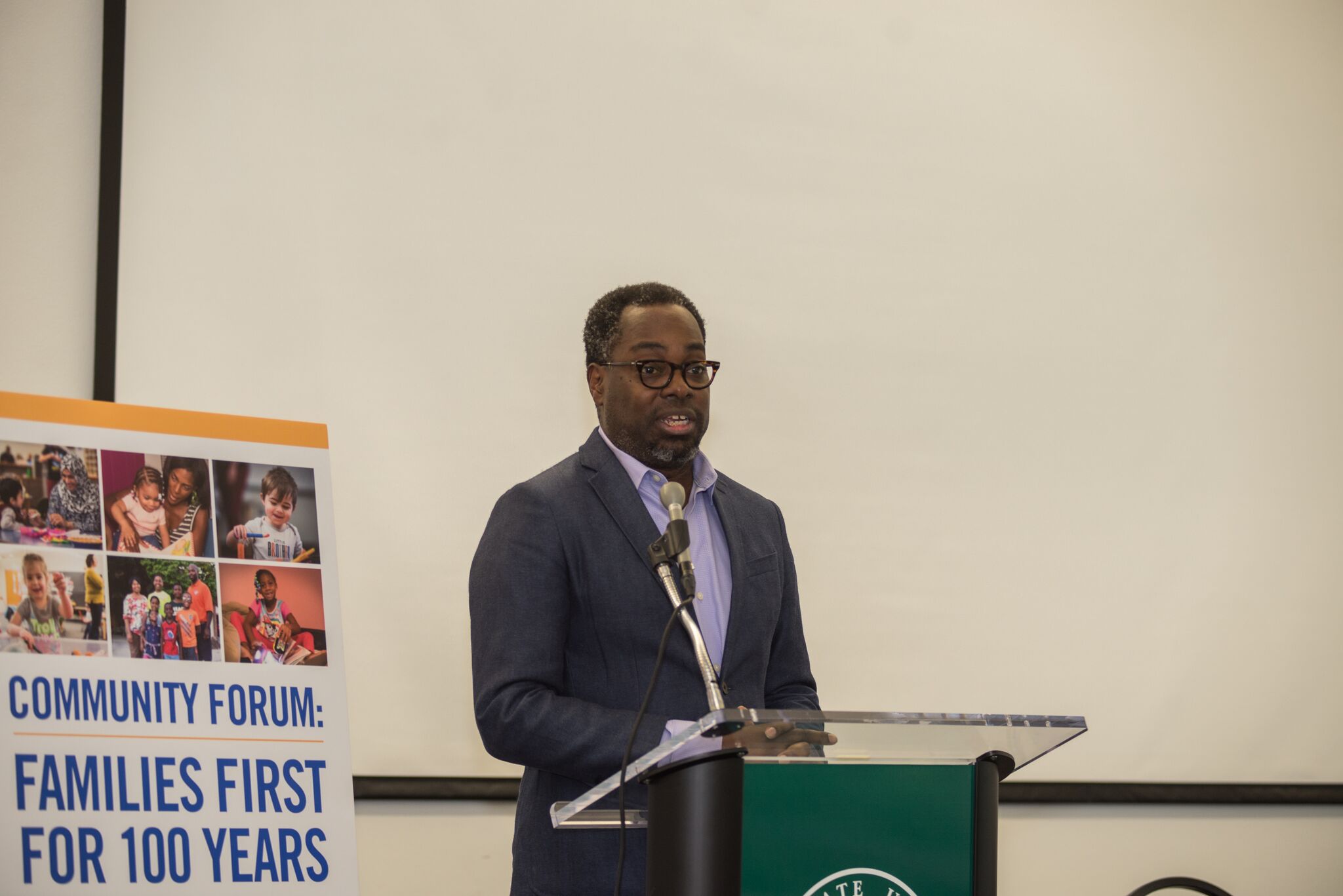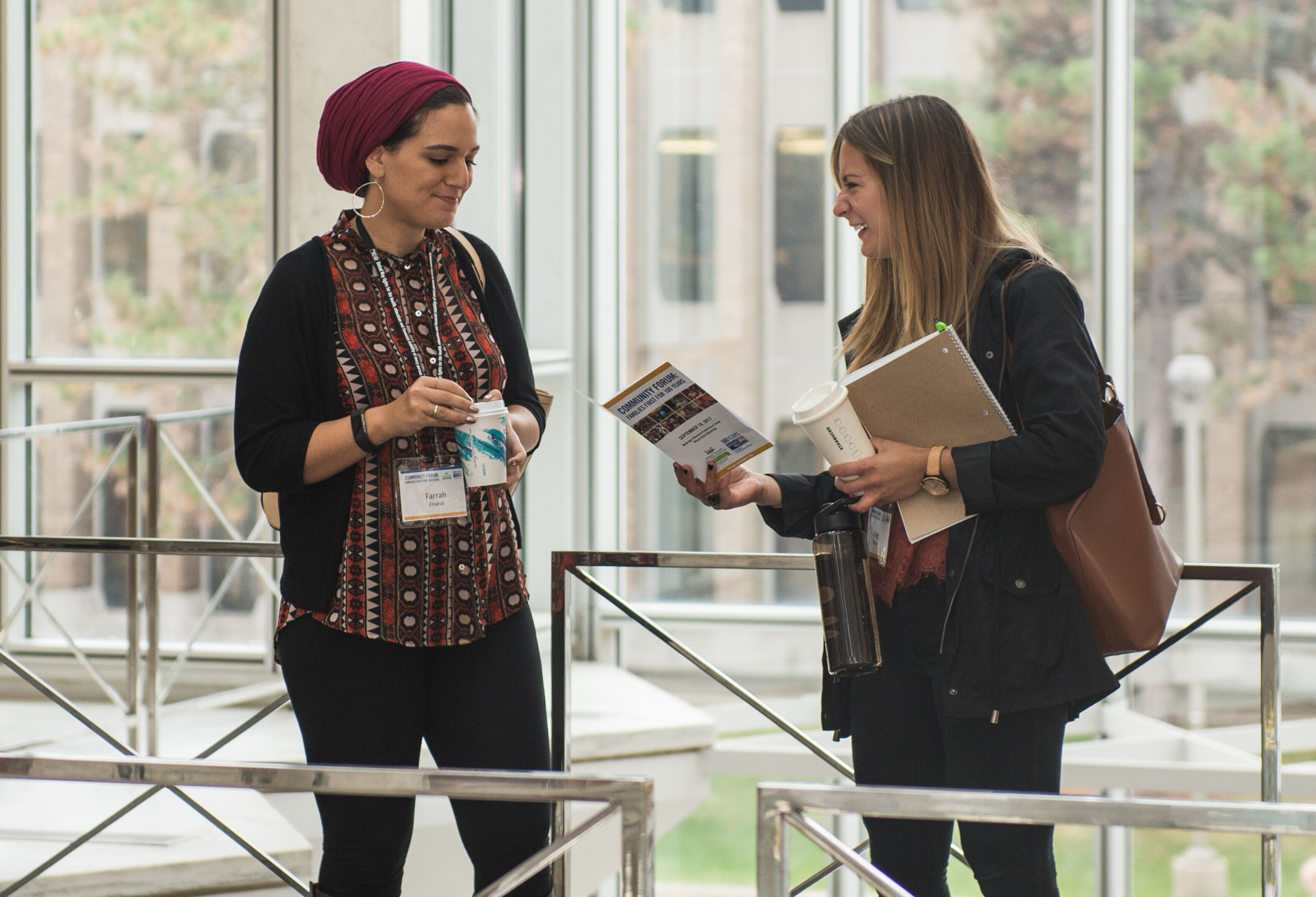Devoting 100 years to children and families of Detroit
One hundred years of helping children and families in Southeast Michigan may seem like a long time. But for the Merrill Palmer Skillman Institute (MPSI) and the United Way for Southeastern Michigan (UWSEM), the shared milestone feels more like a beginning. The two iconic Detroit organizations partnered Sept. 19 on a community forum called "Families First for 100 Years" to explore research and service intersections now and in the future.
 "We shared current projects and new ideas with each other and our guests," said planning committee member Hilary Ratner, Ph.D. Ratner, former vice president for research at Wayne State University, is training director at MPSI. About 120 people attended the free forum, which included breakout sessions and a keynote presentation from Pulitzer Prize winner Stephen Henderson, an editor for the Detroit Free Press.
"We shared current projects and new ideas with each other and our guests," said planning committee member Hilary Ratner, Ph.D. Ratner, former vice president for research at Wayne State University, is training director at MPSI. About 120 people attended the free forum, which included breakout sessions and a keynote presentation from Pulitzer Prize winner Stephen Henderson, an editor for the Detroit Free Press.
"Our breakout sessions showcased the exceptional work being done by both organizations. This event is a springboard into what we hope will be an even deeper partnership. We look to our many community partners to co-create the next steps we might take together," Ratner said.
Sessions covered healing childhood trauma, the importance of fathers, parent education and engagement, arts and preschoolers, measuring impact, early emotional development, healthy eating and activity, and family literacy. Henderson set the day's tone with a personal account of the Tuxedo Project, the restoration of his abandoned family home in Detroit into a neighborhood literacy center. "The house was a wreck, and 24 of the 40 houses on the block were abandoned," said Henderson.
The completed project houses a writer-in-residence and is a gathering spot for neighborhood children and adults. "I was shocked," Henderson said of the condition of his childhood streets and the desperation of its residents. "I'm also inspired by the resilience I see in people who live in areas like that."
Henderson shared stories of an 81-year-old neighbor with no power or running water. A fire on his second  floor was contained, but damaged flooring fell through to the first floor. The man cannot afford repairs so lives around the wreckage. A young woman and her 2-year-old son are squatters in another home on the auction block for tax foreclosure. She also lives with no electricity or water. "They don't walk around complaining. They don't mope. They are ready to help themselves but they just don't have the resources," he said. "What levers do we need to pull to get these people to a better place?"
floor was contained, but damaged flooring fell through to the first floor. The man cannot afford repairs so lives around the wreckage. A young woman and her 2-year-old son are squatters in another home on the auction block for tax foreclosure. She also lives with no electricity or water. "They don't walk around complaining. They don't mope. They are ready to help themselves but they just don't have the resources," he said. "What levers do we need to pull to get these people to a better place?"
Herman Gray, M.D., CEO of UWSEM and Peter Lichtenberg, Ph.D., director of MPSI, discussed how their organizations offer help through direct services, community engagement, fundraising and research. Connecting the people who have needs with the right programs can be difficult. Some families have lost records due to homelessness or other catastrophes, so many don't even have a birth certificate to enroll their child in a Head Start program.
"They can't access the services," Henderson said. "We need to make this easier, to bring the programs to the people." The problem crosses all age groups. Lichtenberg, who also directs the Institute of Gerontology, said two-thirds of older adults in Detroit live in underserved areas where basic needs are unmet.
Gray said that as UWSEM strives to help, "we recognize the resilience and respect the dignity of every child and family in Detroit." He suggested the "old notion of mobile services" as a possible solution to the problem of accessibility.
The panel agreed that agencies need to coordinate services and think more holistically, possibly using technology to streamline and engage. Henderson ended with a challenge for those tasked with helping Detroit's vulnerable. "Can you think differently about this? Can you feel differently about this? How can your institutions start to cover that distance and peel back the barriers?"
After the forum, 30 representatives from programs at UWSEM and MPSI met in a working session to brainstorm next steps and discuss how to turn ideas into action. "We have enough work to keep us busy for the next 100 years," Ratner said.
###
Contact info
Julie O'Connor
Director, Research Communications
Phone: 313-577-8845
Email: julie.oconnor@wayne.edu